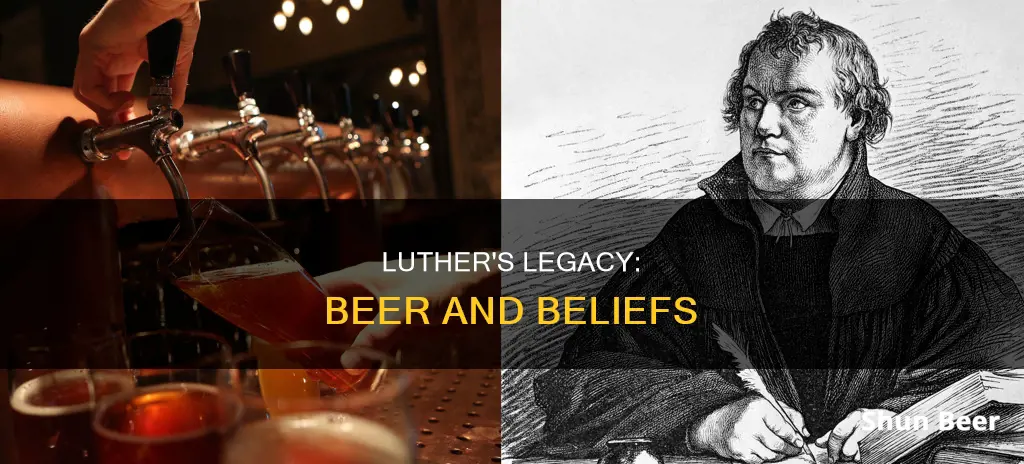
Martin Luther, the German monk-turned-revolutionary who played a decisive role in reshaping the Church, is often quoted as saying Whoever drinks beer, he is quick to sleep; whoever sleeps long, does not sin; whoever does not sin, enters Heaven! Thus, let us drink beer!. However, this quote is just one of many that highlight Luther's complex relationship with beer. On the one hand, Luther is known for his love of beer and his wife's homebrewing skills, and he even promoted the use of hops in beer as an act of rebellion against the Catholic Church. On the other hand, he also preached about drinking in moderation and warned against the dangers of drunkenness, especially among Germans. So, while Luther certainly had a lot to say about beer, it is up to interpretation whether his famous quote should be taken as an endorsement of excessive drinking or as a witty remark with a deeper message about faith and temperance.
| Characteristics | Values |
|---|---|
| Beer as an act of rebellion | Luther promoted the use of hops in beer as an act of rebellion against the Catholic Church |
| Beer as a nutritional source | Beer was considered more nutritious than water |
| Beer as a social fuel | Beer was the social fuel of Germany |
| Beer as a gift | Beer was given as a gift to Luther and his wife, Katharina von Bora, by the town council |
| Beer as a source of joy | Luther encouraged drinking beer in moderation, believing it brought joy to people's lives |
| Beer as a source of income | Luther's wife, Katharina, opened a brewery that produced thousands of pints of beer each year |
| Beer as a symbol of local pride | Luther's hometown, Wittenberg, was known for its beer |
What You'll Learn

Beer as an alternative to violence
Martin Luther, the German monk-turned-revolutionary who played a decisive role in reshaping the Church, is said to have proposed beer as an alternative to violence. In one of his Invocavit Sermons of 1522, Luther said:
> I simply taught, preached, and wrote God’s Word; otherwise I did nothing. And while I slept, or drank Wittenberg beer with my friends Philipp and Amsdorf, the Word so greatly weakened the papacy that no prince or emperor ever inflicted such losses upon it.
Luther's teachings were mocked as "sour beer", and he was disparaged as a heretic from the "filthy market town" of Wittenberg, populated by "a barbarous people who make their living from breweries and saloons". However, as he gained fame, a range of Lutheran merchandise was launched, including beer mugs featuring the pope as the Antichrist.
Luther's promotion of beer as an alternative to violence can be understood in the context of his time. In the 16th century, water was often unsafe to drink, and beer was considered more nutritious. Beer was drunk by everyone and was the nutritional and social fuel of Germany. It was also a way to rebel against the Catholic Church, which had a monopoly on gruit—the mixture of herbs and botanicals used to flavour and preserve beer. Hops, on the other hand, were not taxed, grew plentifully, and had excellent preservative qualities, making beer an international trade symbol of the growing business class.
Luther himself was a beer enthusiast. He often mentioned beer in his letters, boasting about his wife Katharina's brewing skills and expressing his preference for local beer. He also promoted drinking in moderation, saying:
> I wish brewing had never been invented, for a great deal of grain is consumed to make it, and nothing good is brewed... Though we Germans are especially swamped in this vice, as Christians, we ought to be examples of temperance.
So, while Luther may not have literally said, "drink beer", his appreciation for beer and his use of it as a symbol of rebellion and moderation make him an influential figure in the world of beer culture and responsible drinking.
Breastfeeding and Beer: Is It Safe to Drink Alcohol?
You may want to see also

Luther's promotion of hops
Martin Luther's promotion of hops was an act of rebellion against the Catholic Church. In the 16th century, the Catholic Church had a monopoly on gruit—a mixture of herbs and botanicals used to flavour and preserve beer. Hops, on the other hand, were considered undesirable weeds that grew plentifully and vigorously. They were also tax-free, which made them more appealing to brewers.
In addition to financial incentives, hops had excellent preservative qualities, which made beer travel-friendly and facilitated international trade. Hops also had sedative properties, which made them a welcome alternative to the hallucinogenic and aphrodisiacal spices and herbs used by the Catholic Church.
Luther and his followers promoted the use of hops, which led to a change in beer production that continues to this day. Luther, a beer enthusiast, would have relished his role in promoting hops. His love for beer is evident in his letters, sermons, and quotes. In one instance, he wrote to his wife, Katharina, asking her to send him his wine and "a bottle of thy beer". In another instance, he praised Naumburg beer for its laxative properties, which helped with his constipation.
Luther also recognised the social and nutritional value of beer in an age where water was often unsafe to drink. He once said, "I keep thinking what good wine and beer I have at home, as well as a beautiful wife. You would do well to send me over my whole cellar of wine and a bottle of thy beer." Luther's promotion of hops was, therefore, not only an act of rebellion but also a practical and cultural choice that had a lasting impact on the brewing industry.
Beer and Prostate Surgery: What You Need to Know
You may want to see also

Beer as a nutritional and social fuel
Beer has been consumed by people for thousands of years. In the past, it was often regarded as a nutritional and social fuel, and it continues to play a significant role in modern society.
Beer as a Nutritional Fuel
In terms of nutrition, beer is made from grains and contains some vitamins and minerals, including folate, niacin, magnesium, potassium, thiamine, iron, and zinc. However, it is important to note that the amount of these micronutrients in beer is relatively small, and one would need to consume large amounts of beer to meet daily nutrient requirements. Whole foods like fruits and vegetables are much better sources of these essential vitamins and minerals.
Beer also contains calories, with a standard 12-ounce (355 mL) serving providing around 150 calories. The exact number of calories depends on the type of beer, with dark beers typically having more calories due to the addition of malts during the brewing process. Beer has no fat, and most of its calories come from carbohydrates. It also supplies a minimal amount of protein, with light beers containing around 0.7 grams and regular or dark beers providing about 1.6 grams per serving.
While beer is not considered a healthy drink, moderate consumption (defined as no more than two drinks per day or 14 drinks per week for men, and no more than one drink per day or seven drinks per week for women) may offer some potential health benefits. These include a reduced risk of heart disease, improved blood sugar control, stronger bones, and a lower risk of dementia. However, excessive alcohol consumption can lead to various negative health consequences, including an increased risk of depression, liver disease, weight gain, and certain types of cancer.
Beer as a Social Fuel
Throughout history, beer has played a significant role in social interactions and cultural practices. In ancient civilizations, alcoholic drinks, including beer, were used to signify kinship, hospitality, and social cohesion. Beer was often consumed during festivals, religious ceremonies, and social gatherings, and it helped to strengthen social bonds and maintain unity within communities.
In modern times, beer continues to be a popular social lubricant, especially among adolescents and young adults. It is often used as a way to reduce inhibitions and make social events more enjoyable. Beer can facilitate social interactions, making people more outgoing and sociable. It is also associated with rites of passage, as underage drinking is a common way for adolescents to rebel against authority and assert their individuality.
While beer can enhance social experiences, it is important to consume it in moderation and be mindful of potential negative consequences, such as impaired judgment, injuries, and health risks associated with excessive alcohol consumption.
In conclusion, while beer should not be considered a primary source of nutrition, moderate consumption may offer some health benefits. Additionally, beer has played a significant role in social interactions throughout history and continues to be a social fuel in contemporary society.
Cutting Weight and Drinking Beer: Is It Possible?
You may want to see also

Luther's wife's brewing
Martin Luther's wife, Katharina von Bora, was the brewer of the family. She was an intelligent, talented, and exceptionally competent woman who bore six children and managed the Luthers' large household with its endless stream of guests. In addition, she planted a vegetable garden and fruit trees, raised cows and pigs, had a fish pond, drove a wagon, and opened a brewery that produced thousands of pints of beer each year.
Katharina's initial attempts at brewing produced a thin, weak brew, but she quickly improved and learned exactly how much malt to add to suit her husband's taste. Luther was ecstatic—he called her "Lord Katie", and her brewing assured him a steady supply even when Wittenberg's breweries ran dry. Luther often mentioned beer in his letters, boasting about his wife's brewing skills and how her beer was better than the local offerings. In one letter, he wrote:
> I keep thinking what good wine and beer I have at home, as well as a beautiful wife. You would do well to send me over my whole cellar of wine and a bottle of thy beer.
Katharina's brewery was just one of her many endeavours that helped provide for their family, the numerous students who boarded with them, and her husband's visitors. She also bred and sold cattle and ran a profitable brewery. After Luther's death in 1546, Katharina was left in difficult financial straits. Despite owning land, properties, and the Black Cloister, she was in poverty and had to leave Wittenberg due to the outbreak of the Schmalkaldic War. She died in 1552 at the age of 53, leaving behind a legacy as a seminal figure of the Protestant Reformation.
How Much Is Too Much? Drinking 12 oz Beer
You may want to see also

Luther's beer theses
First Thesis: Beer is good
Martin Luther was a beer enthusiast. In a 1522 sermon, he admitted that he enjoyed a good beer after work. In another sermon in 1539, he endorsed beer, saying, "God does not forbid you to drink...He permits you to drink wine and beer."
Second Thesis: Too much beer is bad
Luther qualified his statement by urging his listeners not to drink excessively. He said, "do not make a pig of yourself; remain a human being." He further added, "If you have been a pig, then stop being one."
Third Thesis: Brew sustainably and charge fair prices
Luther had strong words for businesspeople, including brewers, who charged too much for their products. He believed that charging excessive prices was a form of theft. He also expressed concern about the environmental impact of brewing, specifically the depletion of natural resources.
Fourth Thesis: Drink Locally
Luther's endorsement of local beer is evident in his reference to "Wittenberg beer" in his Invocavit Sermons of 1522. This aligns with modern beer culture's focus on local brewing.
Fifth Thesis: Drink Responsibly
Luther urged his followers not to drink to excess and not to be consumed by thoughts about beer. He believed that people should not neglect spiritual matters and other important aspects of life, such as friends, family, and health, due to their preoccupation with beer.
Drinking Beer Outdoors: What US Law Says
You may want to see also
Frequently asked questions
Yes, Luther did say "Drink beer". In a 1522 sermon, Luther admitted that he enjoyed a good beer after work. He also endorsed beer from the pulpit, saying, "God does not forbid you to drink...He permits you to drink wine and beer."
Luther's statement about drinking beer was made in the context of preaching on the dangers of drinking to excess. He urged his listeners to "drink responsibly" and not to make "pigs" of themselves.
Luther had a lot to say about beer. He believed that beer was good, but too much was bad. He also advocated for drinking locally brewed beer and charging fair prices for it.
Luther and his followers promoted the use of hops in beer as an act of rebellion against the Catholic Church, which had a monopoly on gruit, the mixture of herbs and botanicals used to flavour and preserve beer. Hops, on the other hand, were not taxed and grew plentifully.







